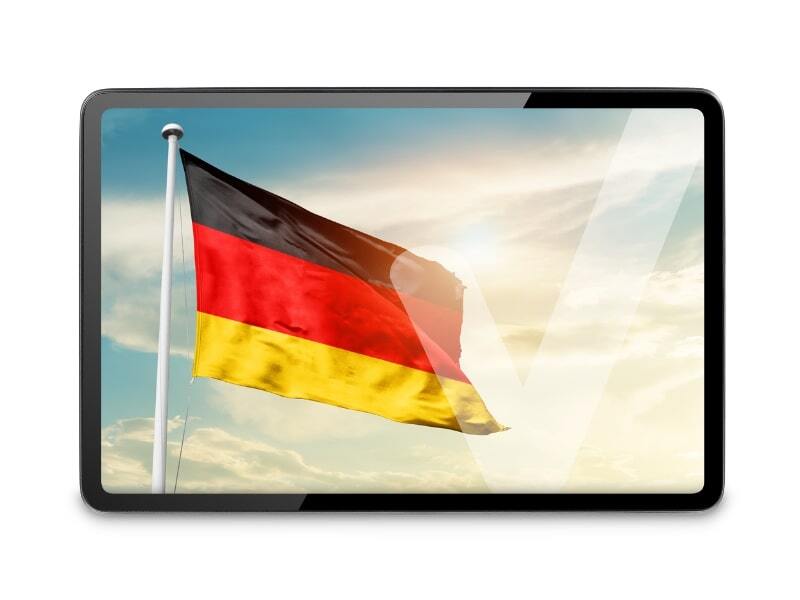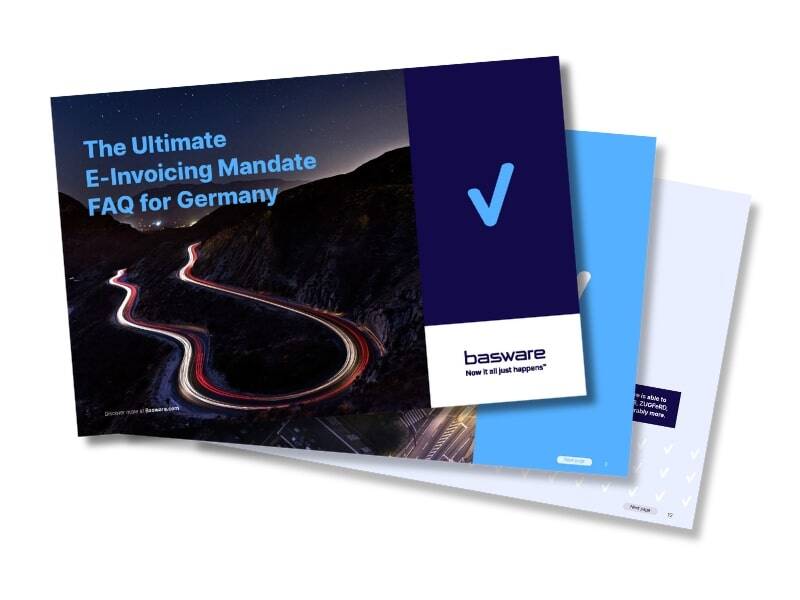- Home
- en
- compliance map
- germany
Electronic Invoicing in Germany
Is e-invoicing mandatory in Germany ?
Germany is gradually enforcing e-invoicing. The mandate phase-in begins from January 2025, requiring businesses to accept e-invoices, and is fully enforced by January 2028, when all suppliers and buyers must issue electronic invoices.
Who is affected?
All German businesses with a registered VAT ID must comply with the mandate requirements.
Compliance requirements
Businesses must prepare for the phased B2B e-invoicing rollout, ensuring compliance with structured EN16931 formats by the defined deadlines. The mandate applies to domestic invoicing.
Frequently asked questions
Find clear answers to the most common questions about the German e-invoicing mandate.
Want to learn more about e-Invoicing compliance?
Download our Global e-invoicing and Tax Compliance fact sheet here for more information.
Electronic Invoicing in Germany
Is e-invoicing mandatory in Germany ?
Germany is gradually enforcing e-invoicing. The mandate phase-in begins from January 2025, requiring businesses to accept e-invoices, and is fully enforced by January 2028, when all suppliers and buyers must issue electronic invoices.
Who is affected?
All German businesses with a registered VAT ID must comply with the mandate requirements.
Compliance requirements
Businesses must prepare for the phased B2B e-invoicing rollout, ensuring compliance with structured EN16931 formats by the defined deadlines. The mandate applies to domestic invoicing.
Frequently asked questions
Find clear answers to the most common questions about the German e-invoicing mandate.
Want to learn more about e-Invoicing compliance?
Download our Global e-invoicing and Tax Compliance fact sheet here for more information.
Key Deadlines
- January 1, 2025: All German businesses must accept electronic invoices in a structured format.
- January 1, 2027: Companies with an annual turnover of at least 800,000 euros must issue e-invoices that comply with EN16931.
- January 1, 2028: All companies must issue invoices electronically in compliance with EN16931.
Key Deadlines
- January 1, 2025: All German businesses must accept electronic invoices in a structured format.
- January 1, 2027: Companies with an annual turnover of at least 800,000 euros must issue e-invoices that comply with EN16931.
- January 1, 2028: All companies must issue invoices electronically in compliance with EN16931.
Standards & Platforms
What formats are required in Germany?
Invoices must comply with the EN16931 standard. Accepted formats include ZUGFeRD and XRechnung. Any format meeting EN16931 requirements is acceptable. There is no government-mandated platform for invoice submission.
Standards & Platforms
What formats are required in Germany?
Invoices must comply with the EN16931 standard. Accepted formats include ZUGFeRD and XRechnung. Any format meeting EN16931 requirements is acceptable. There is no government-mandated platform for invoice submission.
Archiving in Germany
What are the archiving requirements in Germany?
E-invoices must be archived in their original received format without alterations. Businesses must retain e-invoices for 10 years from the end of the year they were issued. Some invoices may require longer retention periods. VAT-related documents cannot be deleted after the 10-year period if they are still needed for tax purposes.
Legal invoice:
- For suppliers: The legal invoice is the e-invoice sent to the recipient in the format they receive. If sent via email, the email is part of the legal invoice.
- For buyers: The legal invoice is the e-invoice received from the supplier in its original format. If sent via email, the email is part of the legal invoice.
Want to know more about Basware’s archiving services?
Download our Basware Vault fact sheet here to learn more about our flexible and scalable solution.
Archiving in Germany
What are the archiving requirements in Germany?
E-invoices must be archived in their original received format without alterations. Businesses must retain e-invoices for 10 years from the end of the year they were issued. Some invoices may require longer retention periods. VAT-related documents cannot be deleted after the 10-year period if they are still needed for tax purposes.
Legal invoice:
- For suppliers: The legal invoice is the e-invoice sent to the recipient in the format they receive. If sent via email, the email is part of the legal invoice.
- For buyers: The legal invoice is the e-invoice received from the supplier in its original format. If sent via email, the email is part of the legal invoice.
Want to know more about Basware’s archiving services?
Download our Basware Vault fact sheet here to learn more about our flexible and scalable solution.
Key Actions
- Ensure Compliance – Prepare to issue and receive e-invoices in EN-16931 formats by the required deadlines.
- Communicate with Suppliers – Align invoicing processes with suppliers for a smooth transition.
- Archive e-Invoices – Ensure compliance with archiving regulations.
German E-Invoicing and Archiving requirements at a glance:
| B2G | Mandatory | Since November 2020 (Federal level), with gradual state-level implementation |
| B2B | Mandatory | Phased enforcement from January 2025 |
Supplier requirement: B2B-invoices must be sent in an EN16931-compliant format to the buyer
Buyer requirement: German buyers are required to be able to receive invoices in electronic format complying to the EN 16931 norm. Public buyers may be required to utilize respective portals.
Archiving requirement: Both the supplier and buyer must archive legal for at least 10 years from the end of the year the document was issued. VAT-related documents cannot be deleted before the required retention period.
Key Actions
- Ensure Compliance – Prepare to issue and receive e-invoices in EN-16931 formats by the required deadlines.
- Communicate with Suppliers – Align invoicing processes with suppliers for a smooth transition.
- Archive e-Invoices – Ensure compliance with archiving regulations.
German E-Invoicing and Archiving requirements at a glance:
| B2G | Mandatory | Since November 2020 (Federal level), with gradual state-level implementation |
| B2B | Mandatory | Phased enforcement from January 2025 |
Supplier requirement: B2B-invoices must be sent in an EN16931-compliant format to the buyer
Buyer requirement: German buyers are required to be able to receive invoices in electronic format complying to the EN 16931 norm. Public buyers may be required to utilize respective portals.
Archiving requirement: Both the supplier and buyer must archive legal for at least 10 years from the end of the year the document was issued. VAT-related documents cannot be deleted before the required retention period.
Electronic Invoicing in Germany
Is e-invoicing mandatory in Germany ?
Germany is gradually enforcing e-invoicing. The mandate phase-in begins from January 2025, requiring businesses to accept e-invoices, and is fully enforced by January 2028, when all suppliers and buyers must issue electronic invoices.
Who is affected?
All German businesses with a registered VAT ID must comply with the mandate requirements.
Compliance requirements
Businesses must prepare for the phased B2B e-invoicing rollout, ensuring compliance with structured EN16931 formats by the defined deadlines. The mandate applies to domestic invoicing.
Frequently asked questions
Find clear answers to the most common questions about the German e-invoicing mandate.
Want to learn more about e-Invoicing compliance?
Download our Global e-invoicing and Tax Compliance fact sheet here for more information.
Key Deadlines
- January 1, 2025: All German businesses must accept electronic invoices in a structured format.
- January 1, 2027: Companies with an annual turnover of at least 800,000 euros must issue e-invoices that comply with EN16931.
- January 1, 2028: All companies must issue invoices electronically in compliance with EN16931.
Standards & Platforms
What formats are required in Germany?
Invoices must comply with the EN16931 standard. Accepted formats include ZUGFeRD and XRechnung. Any format meeting EN16931 requirements is acceptable. There is no government-mandated platform for invoice submission.
Archiving in Germany
What are the archiving requirements in Germany?
E-invoices must be archived in their original received format without alterations. Businesses must retain e-invoices for 10 years from the end of the year they were issued. Some invoices may require longer retention periods. VAT-related documents cannot be deleted after the 10-year period if they are still needed for tax purposes.
Legal invoice:
- For suppliers: The legal invoice is the e-invoice sent to the recipient in the format they receive. If sent via email, the email is part of the legal invoice.
- For buyers: The legal invoice is the e-invoice received from the supplier in its original format. If sent via email, the email is part of the legal invoice.
Want to know more about Basware’s archiving services?
Download our Basware Vault fact sheet here to learn more about our flexible and scalable solution.
Key Actions
- Ensure Compliance – Prepare to issue and receive e-invoices in EN-16931 formats by the required deadlines.
- Communicate with Suppliers – Align invoicing processes with suppliers for a smooth transition.
- Archive e-Invoices – Ensure compliance with archiving regulations.
German E-Invoicing and Archiving requirements at a glance:
| B2G | Mandatory | Since November 2020 (Federal level), with gradual state-level implementation |
| B2B | Mandatory | Phased enforcement from January 2025 |
Supplier requirement: B2B-invoices must be sent in an EN16931-compliant format to the buyer
Buyer requirement: German buyers are required to be able to receive invoices in electronic format complying to the EN 16931 norm. Public buyers may be required to utilize respective portals.
Archiving requirement: Both the supplier and buyer must archive legal for at least 10 years from the end of the year the document was issued. VAT-related documents cannot be deleted before the required retention period.
Subscribe to the e-Invoicing Compliance News Blog!
Keep up to date with e-Invoicing in Germany
The Ultimate E-Invoicing FAQ for Germany: Answering the Top Questions from Businesses Like Yours
The upcoming e-invoicing mandate in Germany has raised numerous questions for businesses, particularly those operating in the B2B space. If you're wondering...
German E-Invoicing Mandate: First Requirements Take Effect on January 1, 2025
On March 22, 2024, the German Bundesrat, the upper chamber of Parliament, approved the Growth Opportunities Act. A key provision of this legislation introduces...
Germany's e-Invoicing Evolution: Latest Updates & Insights
The electronic invoice (e-invoice) is coming to Germany - albeit in a different way than many people, myself included, had hoped it would. It is, as most...
Find e-invoicing compliance and regulatory updates by country:
Africa
Asia
China | India | Indonesia | Japan | Kazakhstan | Malaysia | Philippines | Saudi Arabia | Singapore | South Korea | Turkey | United Arab Emirates | Vietnam
Europe
Albania | Andorra | Austria | Belgium | Bulgaria | Czech Republic | Denmark | Estonia | Finland | France | Germany | Greece | Hungary | Iceland | Ireland | Italy | Latvia | Liechtenstein | Luxembourg | Malta | Netherlands | Norway | Poland | Portugal | Romania | Serbia | Slovakia | Slovenia | Spain | Sweden | Switzerland | United Kingdom
North America
Canada | Colombia | Costa Rica | Ecuador | Mexico | Panama | United States



